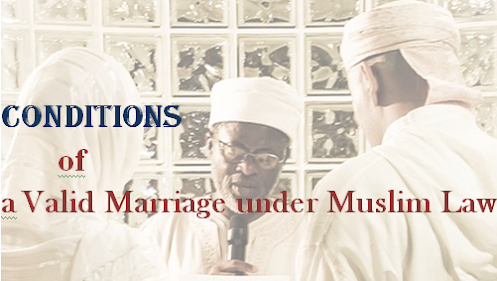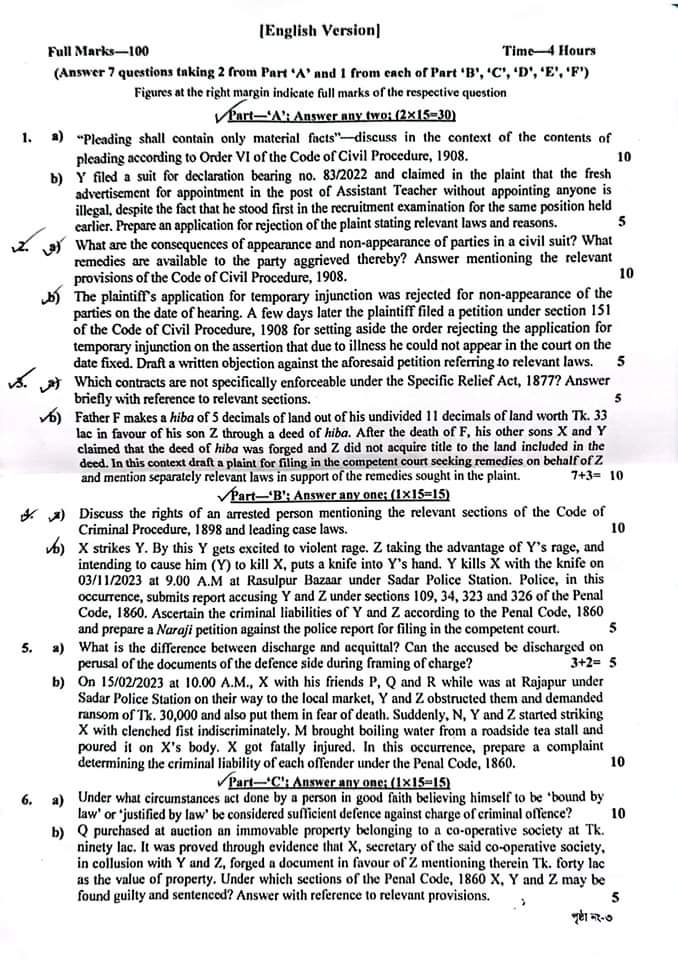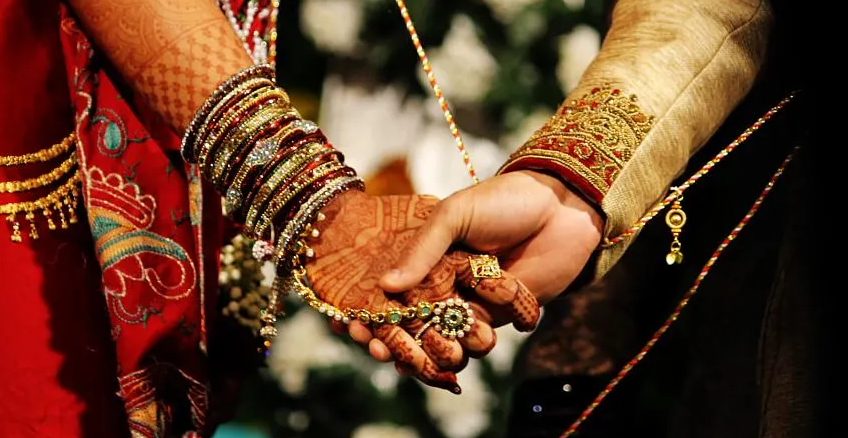Marriage under Muslim Law: Bangladesh in Aspect
Introduction:
Marriage is a social institution that legalizes sex relationship between a man and a woman and protection of children. Marriage under Islamic law plays a central role in personal as well as social life of a Muslim because Islamic Law does not recognize any extra marital relationship. And many rights and obligations of Muslims i.e. legitimacy of children, claim of maintenance, question regarding right to inheritance etc., are solely dependent on a valid marriage.
Definition:
The general Arabic term to mean marriage is ‘nikah’ which literally means ‘joining together’ as this legalizes the living together of two persons as husband and wife. In legal sense the term marriage has a special meaning. Jurists defined it from different perspective.
Mahmud-Al-Nasafi in Kinz-al-Daqaiq, a famous Hanafi book, identified it as:
“A contract that is entered into by a man with a woman for the enjoyment of the beneficiary rights over her as an owner.”
• Hedaya another authentic Hanafi book treated it as:
“As a contract entered into for the purpose of legalizing generation”
• Syed Amir Ali defines it as:
“An institution ordained for the protection of the society in order that guard themselves from foulness and un chastity.”
• In Abdul Kadir Vs. Salima, ILR (1886)149, J. Mahmood held that:
“Marriage under Muhammadans is not a sacrament, but purely a civil contract.”
The Supreme Court of Pakistan in famous Khurshid Bibi case and the HCD of the Supreme Court of Bangladesh in Anwar Hossain Vs Momtaz Begum (1999) upheld the same view
Nature of Marriage under Islamic Law:
Most of the above definitions treated marriage as civil contract and treated sex rights as unilateral rights of the husband over his wife that don’t reflect the real Quranic overtone because the Quran treats it as mutual right. Again, Marriage under Islamic Law can be treated as an ‘ibadat’ or righteous act because Islam enjoins every capable man and woman to marry. As the Prophet (sm) expressly declared that Islam does not recognize any celibacy.
But definition of Syed Amir Ali reflects both individual and social purposes of marriage. Although the nature of Muslim marriage is a matter of controversy, it can be well argued against the view of above definition in terms of capacity of parties, rights and duties, presence of witness etc.
Formation or Formal Conditions of Marriage:
Following forms or formal conditions has to be complied with in a marriage among the Muslims:
1. Offer (Ijab)
2. Acceptance (Qabul)
3. Presence of Witnesses:
– Sunni schools except Imam Malik confirms it as an essential condition. But Shia schools don’t require such condition to be complied with.
– Number of witness: there must be two males or one male and two females and the Quranic view regarding commercial transaction regarding the number of women witnesses has been applied here by juristic analogy (Qiyas).
– Capacity of Witnesses:
The witness shall be
a) free muslim
b) persons of sound mind
c) capable of understanding the formation of marriage
d) and capable of hearing offer and acceptance and seeing sign.
Condition of a Valid Marriage Regarding/Personal Capacity:
Gender of Parties:
Marriage must be solemnized between a male and female not otherwise.
Religious Faith:
According to Hanafi Law Marriage has to be between a Muslim male and Muslim female or a Muslim male and a Kitabian female. But a permanent marriage between a Muslim and a Kitabian is not possible under Shia School of Law. Finally, the Special Marriage Act, 1877 lifted such restrictions if the parties recognize that they don’t profess any religion. Different Schools Muslims belonging to different schools such as Shia, Sunni, Hanafi, Shafi, etc. can freely inter-marry and there is no rule as is in the case of different religion. If both spouses belong to different schools of Muslim Law, each spouse retains his or her own school.
Number:
A Muslim man can marry not exceeding four wives at a time. However, a Muslim woman can marry only one. But there are some stron restrictions for a man in case of marrying more than one and that is adl or justice. And statutory requirements for polygamy are contained under section 6 the Muslim Family Laws Ordinance, 1961(MFLO).
“Section 6 of MFLO, 1961:
(1) No man, during the subsistence of an existing marriage, shall, except with the previous permission in writing of the Arbitration Council, contract another marriage, nor shall any such marriage contracted without such permission be registered 6[ under the Muslim Marriages and Divorces (Registration) Act, 1974 (LII of 1974)].
(2) An application for permission under sub-section (1) shall be submitted to the Chairman in the prescribed manner, together with the prescribed fee, and shall state the reasons for the proposed marriage, and whether the consent of the existing wife or wives has been obtained thereto.
(3) On receipt of the application under sub-section (2), the Chairman shall ask the applicant and his existing wife or wives each to nominate a representative, and the Arbitration Council so constituted may, if satisfied that the proposed marriage is necessary and just, grant, subject to such conditions, if any, as may be deemed fit, the permission applied for.
(4) In deciding the application the Arbitration Council shall record its reasons for the decision, and any party may, in the prescribed manner, within the prescribed period, and on payment of the prescribed fee, prefer an application for revision 7[ * * *] to the 8[ Assistant Judge] concerned and his decision shall be final and shall not be called in question in any Court.
(5) Any man who contracts another marriage without the permission of the Arbitration Council shall-
(a) pay immediately the entire amount of the dower, whether prompt or deferred, due to the existing wife or wives, which amount, if not so paid, shall be recoverable as arrears of land revenue; and
(b) on conviction upon complaint be punishable with simple imprisonment which may extend to one year, or with fine which may extend to 9[ ten thousand taka], or with both.”
Prohibited Degree:
Following kinds of women are prohibited for a Muslim male marry with. And a marriage in contravention of this rule is totally void in some cases irregular.
(a) Consanguinity: A man is prohibited from marrying:
(1) his mother, grandmother how-high-so-ever,
(2) his daughter or granddaughter- how-low-so-ever
(3) his sister whether full, consanguine or uterine
(4) his niece or great niece how-low-so-ever, paternal or maternal.
(b) Affinity: A man is prohibited from marrying
(1) Ascendants or Descendants of his wife and
(2) the wife of an ascendant or descendant.
c) Fosterage: A man may not marry his foster mother or her daughter of foster sister.
d) Unlawful Conjunction: A man is also forbidden to have, at a time two wives who are two sisters. There is nothing to restrict a man from marrying his wife’s sister after the death or divorce of his wife. Prohibition is applicable only during the subsistence of marriage and life time of the wife.
Iddat:
When a marriage is dissolved either by death or divorce, in the interest of certainty of paternity, the woman is prohibited from marrying again within a specified time and she is supposed to abstain from sexual intercourse. This period is called as Iddat. Allah says in the Holy Quaran about the period of iddat—
“And those of you who die and leave wives behind them, they (the wives) shall wait (as regards their marriage) for four months and ten days.” (Surah Al-Baqarah, Verse 234) If the widow is pregnant, then the waiting period is till the birth of the child, irrespective of whether it is before the 4 month 10 days period or several months after it. “And for those who are pregnant, their Iddah (prescribed period) is until they lay down their burden; ” (Surah At-Talaq, Verse 4)”
Soundness of mind:
Muslim Marriage is generally treated as a contract where free consent of both parties is an essential condition. Parties to a marriage must be of sound mind to complete a marriage solemnized under Muslim Law.
Attaining the Majority:
A Muslim has to attain the age of majority for a valid marriage. In this regard there is a distinction of opinions among jurists. As, Imam Abu Hanifa says that:
“the marriage of a child is valid, if that is given by a guardian who is an Asaba while other accepts only father and fathers as marriage guardian”
In Islamic Law there is no specific age of majority rather it is solely dependent on the physical growth of boys and girls in terms of puberty. Thus a girl attains majority when she begins menstruate and a boy attains majority when he starts getting night pollution. But age of 15 is regarded as the probable age of majority when it cannot be possible to ascertain their actual status of majority.
Statutory law in Bangladesh fixes age of majority: the Majority Act, 1875 fixes 18 years for both of male and female. But majority regarding marriage is not the same. Majority regarding marriage is ascertained under the Child Marriage Restraint Act, 1929 fixes the age of marriage (majority) for a male 21 years and for a female 18 years. (section 2). Furthermore, section 5 and 6 provides punishment for child marriage.
Women’s Capacity to Marry:
Before attaining the puberty no-one male or female can contract a marriage except through guardian. For a major boy consent of wali or guardian is not required at all. For a major non virgin girl consent of wali is not required. But for a major virgin girl thing is controversial among the Imams. As Imam Abu Hanifa affirms that women have the full legal capacity to marry and consent of wali is not required.
According to majority of schools (Shafi, Malik and Humbli) women don’t have full legal capacity to marry. So, consent of wali is required.
Bride’s consent:
For non virgin girl, consent of bride is must (All Imams).
For virgin girl: (Hanafi) Consent of girl is required
Option of Puberty:
Khiyarul Bulug or Option of puberty is an option for women to repudiate the marriage after attaining the majority where she has been given in marriage by her guardians before her attaining the majority. But condition is that the marriage must be unconsummated after the attaining the majority. This is equally recognized in Sharia as well as statutory law.
Section 2(vii) of the Dissolution of Muslim Marriage Act, 1939 reads as follows:
“A woman married under Muslim law shall be entitled to obtain a decree for the dissolution of her marriage on the ground that she, having been given in marriage by her father or other guardian before she attained the age of eighteen years repudiated the marriage before attaining the age of nineteen years”
Kinds of Marriage:
Marriages under Islamic Law are of three kinds:
1. Valid or Sahih Marriage:
Under the Muslim law, a valid marriage is marriages which have been constituted in accordance with the essential conditions prescribed earlier.
Outcome of Valid Marriage:
A valid marriage confers some rights upon the wife i.e., the right of dower, maintenance and residence. It also imposes on her obligation to be faithful and obedient to her husband, admit sexual intercourse with him and observe Iddat. Mutual intercourse between husbnd and wife is legalized and the children so born during the substance of a valid marriage are legitimate during continuance of a valid marriage.
Termination of a Valid Marriage:
A valid marriage is terminated either by divorce or death of either party.
2. Fasid or Irregular Marriage:
The following marriages are regarded as irregular under the Muslim Law:
–Marriage without witnesses.
–Marriage with woman undergoing Iddat.
–Marriage prohibited by reason on difference of religion.
–Marriage in contravention of rules of unlawful conjunction.
–Marriage with two sisters during the life time of the other.
– Marriage with Fifth wife.
(This list is not exhaustive because there are distinctions of opinions among the jurist)
Outcome of Irregular Marriage:
The irregular (Fasid) marriage creates a week tie between husband and wife giving very few rights. It was said by the Privy Council in a case dealing with a Chinese conjugal union that:
“a court may do well to recollect that it is a possible jural conception that a child may be legitimate though its parents were not and could not be legitimately married.”
If there has been consummation, the wife is entitled to dower (Mahar), proper or specified, whichever is lesser and she must observe Iddat for three courses but right of inheritance is not created when irregular marriage is concerned. But children so born in the continuance of an irregular marriage are legitimate and are entitled to property by inheritance.
Termination of Irregular Marriage:
A Fasid marriage may be terminated by either party at any time; neither divorce nor the intervention of a court is necessary.
3. Void or Batil Marriage:
A marriage which is unlawful from its beginning is termed as void or batil marriage. It does not create any civil right or obligation between husband and wife. Following grounds can invalidate the marriage
• Marriage through forced consent.
• Plurality of husband.
• Marriage prohibited on the ground of consanguinity.
• Marriage prohibited on the ground of affinity.
• Marriage prohibited on the ground of fosterage.
- (No Question of Termination)
Muta (Temporary) marriage:
Muta marriage is a temporary marriage.Unlike Sunni schools this type of marriage is recognized in Shia school of law.
Registration of Muslim Marriage:
In Sharia Law there is no such requirement that the marriage is to be registered. But the Registration of Muslim Marriages and Divorces Act, 1974 has made the registration of Muslim marriage mandatory and contradiction of this provision will make them liable to concede punishment .
Section 3 of the Act says:
“Notwithstanding anything contained in any law, custom or usage, every marriage solemnized under Muslim law shall be registered in accordance with the provisions of this Act.”
• Section 5(4) says:
“A person who contravenes any provision of this section commits an offence and he shall be liable to be punished with simple imprisonment for a term which may extend to two years or with fine which may extend to three thousand taka, or with both.”
Though, non-registration of a Muslim marriage is a punishable issue under the Registration of Muslim Marriages and Divorces Act, 1974, nothing is said about the validity of a Muslim marriage which has not been registered under this Act. However, even if a marriage is not registered under this Act, it shall be valid on the compliance with the conditions laid down by Islamic Sharia Law.






